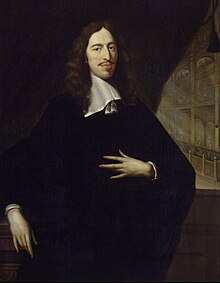Talk:Johan de Witt
| This is the talk page for discussing improvements to the Johan de Witt article. This is not a forum for general discussion of the article's subject. |
Article policies
|
| Find sources: Google (books · news · scholar · free images · WP refs) · FENS · JSTOR · TWL |
| This It is of interest to the following WikiProjects: | ||||||||||||||||||
| ||||||||||||||||||
Untitled[edit]
Shouldn't this be Jan de Witt? I've always seen it as such. john k 07:11, 22 Jun 2005 (UTC)
- You are right. And you are mistaken :o) For many centuries Dutch children have been given christian names that are never used in everyday life. The official names are spoken at the baptism, their marriage and their funeral — and never in between. Of course this phenomenon exists in other European countries also, but the Dutch carry it to extremes. Hence the joke: "We proudly announce the birth of our son Quintus Theophilus, we'll call him Bartje". So Johannes de Witt was Jantje as a boy and Jan when a grown man. His brother Cornelis was known first as Keesje and later Kees. Still in a historical account, the Dutch tend to use the official name. This has been rather common for Johan de Witt also, though the name is in a slightly more vernacular form, which should perhaps be seen as sign of endearment, like the stadtholders are never called Wilhelmus, nor the too common Wim, but Willem.
--MWAK 17:32, 23 Jun 2005 (UTC)
Killing[edit]
In the article is said that Cornelis was disembowled while alive. Is there a source for this? According to H.H. Rowen, biographer of De Witt, the brothers were killed immediately outside the prison (as planned) and afterwards their bodies where mutulated, probably not planned.
Rowen, H.H., "Johan de Witt. Staatsman van de 'Ware Vrijheid" published in Leiden in 1985.
Scafloc 18:59, 19 August 2007 (UTC)
Exhibition[edit]
According to the article "the heart of Cornelis de Witt was exhibited for many years next to his brother's by Dirck Verhoeff". Is there any source for this? If not, I think this statement should be removed. Brederode (talk) 08:53, 1 March 2008 (UTC)
- I have provided the requested citation and reinstated the passage about the exhibition of the hearts.--Ereunetes (talk) 23:22, 19 June 2008 (UTC)
Lack of references[edit]
I am amazed that this badly referenced article has been allowed to go unchallenged. It makes numerous questionable and debatable statements without providing any source. I appeal for some administrator to mark the article as untrustworthy until it is better documented. Mzilikazi1939 (talk) 22:11, 20 July 2011 (UTC)
Actually he is French[edit]
Should it not be pointed out that the surname De witt is of french origin And that the De witt ffamily of the netherlands is in fact descended from a french family who moved to the netherlands and that they are more thatn likely jewish? — Preceding unsigned comment added by 50.103.129.21 (talk) 06:03, 8 November 2011 (UTC)
- Of course the addition of such claims requires the support of reliable sources, but if you can provide them it would of course be relevant to mention in the De Witt (family). --Saddhiyama (talk) 09:41, 8 November 2011 (UTC)
Name of the city of Vlissingen[edit]
I was amused to see the minor city of Vlissingen translated to Flushing. Yes, New Yorkers, it's a nice bit of trivia that that's where the neighborhood in Queens got its name. But nobody in either country knows Vlissingen itself by that name. (Former New Yorker now living in The Netherlands here.) --tgeller (talk) 21:25, 10 September 2021 (UTC)
Uncited material in need of citations[edit]
I am moving the following uncited material here until it can be properly supported with inline citations of reliable, secondary sources, per WP:V, WP:CS, WP:IRS, WP:PSTS, WP:BLP, WP:NOR, et al. This diff shows where it was in the article. Nightscream (talk) 15:59, 6 December 2021 (UTC)
Extended content
|
|---|
|
Cannibalism[edit]
I believe it is a common myth that his body was cannibalized. The citations do not prove this event. They claim that these were exaggerated stories. Rudivanhemert (talk) 21:44, 25 March 2023 (UTC)
- The citation is correct. "They were beaten, stabbed, and shot to death. The corpses were dragged to a nearby scaffold and pulled up by the feet to be displayed to the people, and then mutilated, parts being roasted and eaten in a frenzy of cannibalistic hatred."
- (The Dutch Republic : Its Rise, Greatness, and Fall 1477-1806 (Oxford History of Early Modern Europe) DerElektriker (talk) 13:23, 26 December 2023 (UTC)
Needs serious work.[edit]
This article is in wretched shape. It has been edited into a state where much of it is grammatical or logical nonsense. 76.90.100.107 (talk) 12:18, 3 August 2023 (UTC)
- WP:SOFIXIT. --Jayron32 13:15, 3 August 2023 (UTC)
Leading Statesman[edit]
The first paragraph of this section seems to have been truncated at some point. "However, the Provinces, under the dominance of the province of Holland" The Provinces did what under the dominance of Holland? Makes no sense. Couldn't find where this had been messed up in the revision history. 216.158.130.226 (talk) 19:02, 19 December 2023 (UTC)
- C-Class vital articles
- Wikipedia level-5 vital articles
- Wikipedia vital articles in People
- C-Class level-5 vital articles
- Wikipedia level-5 vital articles in People
- C-Class vital articles in People
- C-Class biography articles
- C-Class biography (politics and government) articles
- Low-importance biography (politics and government) articles
- Politics and government work group articles
- WikiProject Biography articles
- C-Class Netherlands articles
- All WikiProject Netherlands pages




